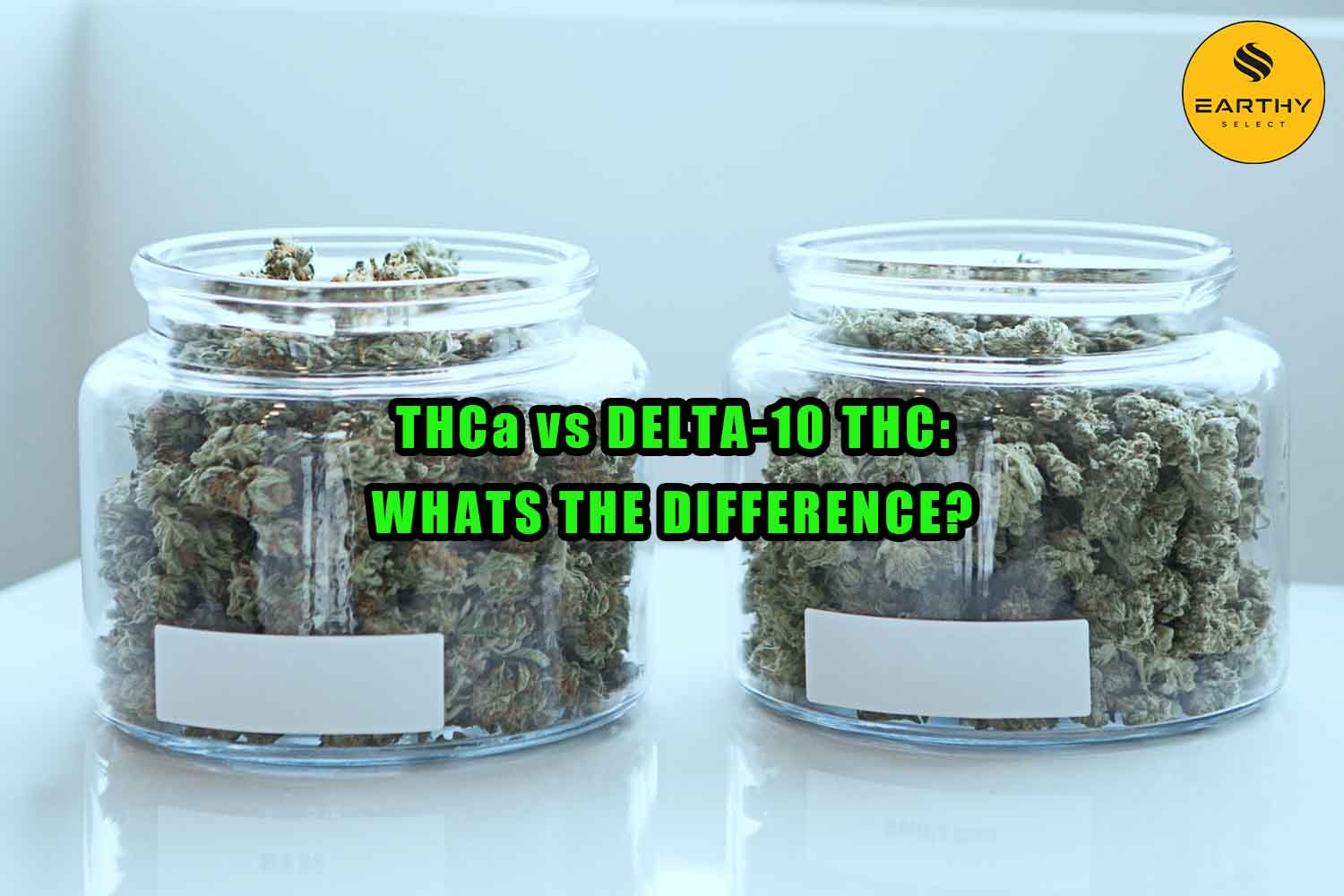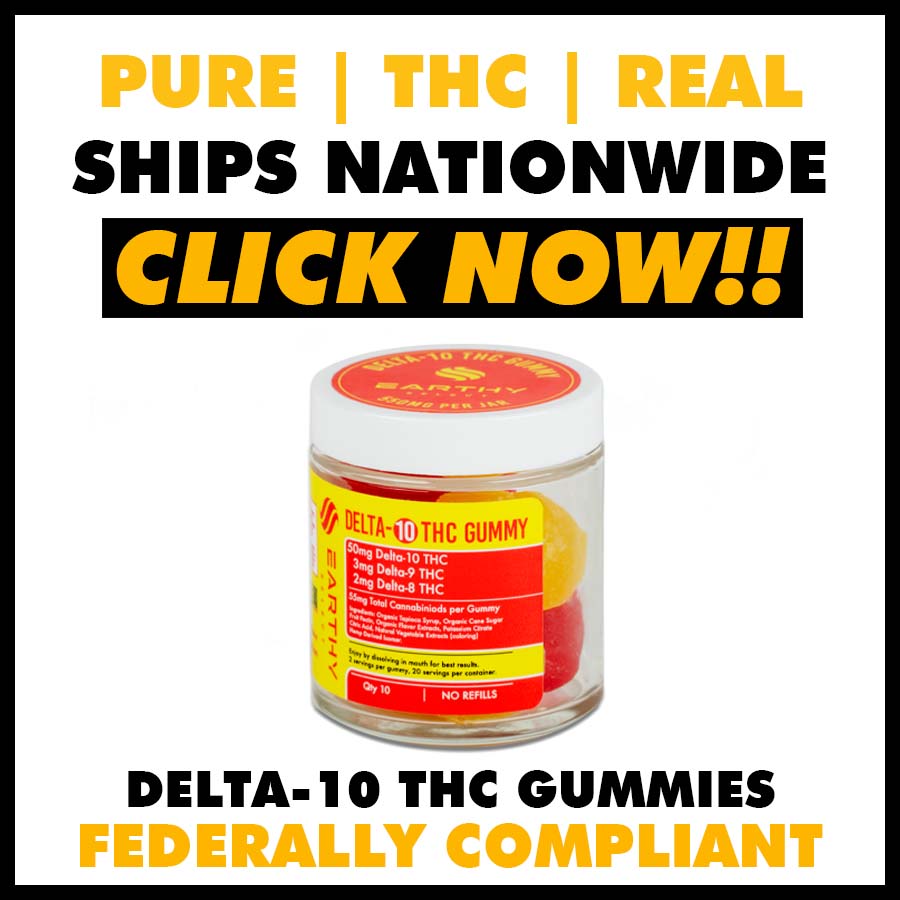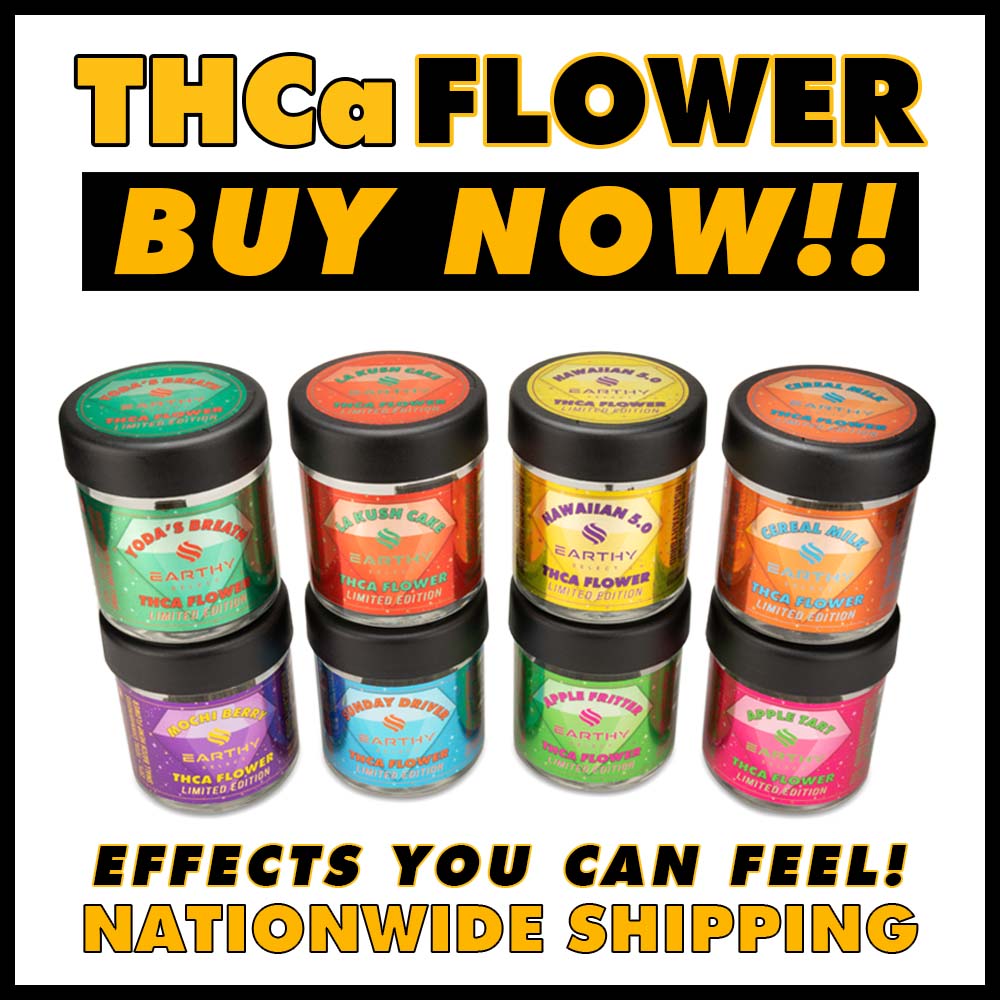THCa vs. Delta-10 THC: What’s the Difference?
THCa versus Delta-10 THC: What’s the Difference? When most people refer to THC, they’re talking about Delta-9 THC (tetrahydrocannabinol)—the main psychoactive component in cannabis. Yet, even though Delta-9 THC is the cannabinoid for which the DEA tests when determining if a plant is hemp or marijuana, there are other forms of THC that are not as closely regulated.
For example, Delta-8 THC and Delta-10 THC have recently risen in popularity as cannabis users discover their unique benefits and wider accessibility. And just as we thought we had our minds wrapped around these three types of THC, many of us have noticed another form of it on the hemp dispensary shelves: THCa. But what is THCa and how does it compare to other forms of THC?
Read on to find out about THCa and Delta-10 THC, how they compare to each other, and what they may offer you in the areas of recreational or medicinal effects.
What is Delta 10 THC? How is it different from Delta-9 and Delta-8?
One of the hundreds of cannabinoids in cannabis Sativa, Delta-10 THC occurs in much smaller concentrations than its more well-known cousin Delta-9. While scant research exists about it, Delta-10 THC is presumed to interact with the endocannabinoid system in a similar way as other THC compounds such as Delta-8 and Delta-9.
These other two forms of THC bind to CB1 receptors in the brain and nervous system, producing varying levels of psychotropic effects. Since Delta-10’s chemical structure is similar, it behaves in the body in a similar way, yet many anecdotally report that Delta-8 THCand Delta-10 THC produce milder psychotropic effects than Delta-9 THC [1].
Guide to Hemp-Derived Delta-9 THC
What is THCa?
In contrast to Delta-8, Delta-9, and Delta-10, THCa is non-psychoactive unless it is heated. Short for tetrahydrocannabinolic acid, THCa is the precursor molecule to non-acidic THC. Before harvest, cannabis plants make cannabinoids in the form of carboxylic acids that usually convert into non-acidic compounds after they go through a process called decarboxylation. Most cannabinoids begin in their acidic form. This acidic version will have different chemical structures and produce different effects than its non-acidic precursor.
Although plentiful in fresh cannabis, THCa is unstable after it is harvested. As it dries and is exposed to light, it begins to decarboxylate, turning it into other psychoactive forms of THC, including Delta-9 THC. It will decarboxylate quickly when heated by smoking, vaping, or cooking.
Potential benefits of THCa
THCa is not a controlled substance because it does not have the intoxicating effects of its non-acidic cousins. Thus, it is sometimes easier to obtain THCa than other forms of THC. However, if you want to convert THCa into THC, you can do it easily by heating it. Many people find THCa’s ability to transform in this way a compelling quality.
In contrast, others enjoy THCa on its pre-decarboxylated merits. By juicing, eating, or making tinctures and smoothies with raw cannabis plants, THCa seekers can take advantage of the unique benefits offered by this non-psychoactive cannabinoid.
Eloise Theisen, MSN, RN, is the assistant chair for the Medical Cannabis Certificate Program at the Pacific College of Health and Sciences, and sings the praises of THCa’s potential health benefits. Some of her patients, she said to Insider Magazine, found relief from pain by using THCa. “Most patients notice a difference with daily use and after a few weeks once the THCa has had a chance to build up in the system and start to reduce the inflammation,” she said.
A 2021 study conducted on mice with liver injury supports her theory about THCa reducing inflammation. In these mice, THCa was found to significantly reduce inflammation pathways [2].
Erik Smith, MD, a medical practitioner with the health tech platform Veriheal, proposes that THCa may offer potential neuroprotective properties, but acknowledges that more research is necessary. “The management of [these] disorders have not been facilitated in clinical practice,” he said, adding, “much of this is theory and the medical cannabis community has not determined preventative or therapeutic protocols.” Nonetheless, another mouse study gives researchers hope that THCa may potentially have real neuroprotective benefits. In the 2017 study, THCa prevented degeneration in certain regions of the brains of mice who were first injected with toxins [3].
THCa vs. THC-10: what’s the difference?
THCa, although abundant in freshly harvested cannabis, begins to change once it is exposed to light or heat. Thus, it is unstable under even controlled storage conditions and readily decarboxylates into some form of psychoactive THC. Delta-10 THC, on the other hand, is only found in small amounts in cannabis and has some level of psychoactivity, similar to Delta-8 and Delta-9 THC.
To Be or Not to Be Psychoactive: THCa vs Delta-8 THC
Is THCa legal?
As counterintuitive as it may seem, the THCa content of a federally compliant hemp product like high-THCa hemp flower, may in fact, convert to the higher THC levels of its marijuana counterpart, but only if it is heated. Put simply, THCa only becomes potentially as psychoactive as marijuana when it is smoked, vaped, or cooked (versus using raw cannabis products). Thus, a federally compliant hemp product can be easily turned into something that could otherwise be considered a controlled substance. In this sense, THCa has a unique double agency under the law.
But the question is, should we worry about using or selling THCa products? The answer is nuanced, because there is a lot of confusion about the laws, even among law enforcement officials. It may be possible that even legal representatives may misinterpret the law and erroneously label a THCa product with less than 0.3 percent Delta-9 THC as marijuana versus hemp because of its potential to turn into THC. But, according to cannabis attorney Rod Kight, they’d likely be wrong [4].
The point to keep in mind is that THCa converts to Delta-9 THC when heated, yet retains the same legal status of its raw, unheated form when evaluated for the hemp market. In contrast, the same plant could be evaluated differently in the regulated marijuana markets and determined to be a marijuana plant because of its “total THC” content. These confusing differences in definitions set the stage for some legal gray areas. Thus, it’s important to carefully consider how your state evaluates hemp and marijuana before buying or selling THCa.
Is Delta-10 THC legal?
Regarding federal compliance, Delta-8 THC and Delta-10 THC are technically legal so long as they are made of cannabis with less than 0.3% Delta-9 THC. These versions of THC are different from Delta-9 THC because the Farm Bill of 2018 made hemp legal to grow, sell, and buy as long as the pre-harvested plant contains less than 0.3 percent Delta-9 THC by dry weight.
Since the Farm Bill focuses only on Delta-9, and not Delta-8 or Delta-10, some think these definitions create a legal loophole. Nonetheless, Delta-8 THC and Delta-10 THC are widely accessible and federally compliant.
Nonetheless, it’s a little more complicated than it appears at the outset. This is because most hemp plants contain only trace amounts of either Delta-8 or Delta-10 THC. This may be an issue in some states because certain states have laws against synthetic cannabinoids. Even so, the definitions of “synthetic cannabinoids” can vary. Because of this landscape of misunderstanding surrounding Delta-8 THC and Delta-10 THC, buyers and sellers of such hemp products need to learn the fine print of their state laws.
The Farm Bills and the legality of cannabis
Thanks to the recent Farm Bills, hemp is now federally compliant in all 50 states. But this fact has been a long time coming. The Marihuana Tax Act of 1937 outlawed cannabis cultivation, making it challenging for farmers to produce even hemp. Further limiting hemp cultivation, Richard Nixon signed the Controlled Substances Act of 1970, which gave hemp the same legal status as marijuana [5].
Finally, hemp’s commercial resurgence came after the 2014 Farm Bill removed hemp from the Drug Enforcement Agency (DEA) list of Schedule 1 substances. This bill made hemp federally compliant and allowed long-forbidden research into hemp-derived cannabinoids to begin.
Four years later, the 2018 Farm Bill legislation expanded on this previous bill and allowed the production, sale, and consumption of hemp-derived products. Legal experts confirmed that the bill made all plant materials and substances derived from legally-defined hemp federally compliant [6].
Federal law defines cannabis plants with less than 0.3 percent Delta-9 THC per dry weight as hemp plants and allows hemp production and consumption in all 50 states. In contrast, a cannabis plant with more than 0.3% Delta-9 THC per dry weight is defined as marijuana which federal law still treats as a controlled substance.
However, many states allow adult use of medical and recreational marijuana containing much more than 0.3% Delta-9 THC.
The Endocannabinoid System (ECS)
A complex system that has evolved over millions of years, the endocannabinoid system (ECS) is the largest receptor system in the human body, whose primary role is to maintain homeostasis. Researchers happened upon this system only recently in the 1980s as they explored the effects of THC on the human body [7]. They were surprised to discover that the system had similar structures to compounds of the cannabis plant, yet with a differential expression in the body. The relationship between cannabis and the ECS is what makes cannabinoids such powerful molecules when consumed.
Our bodies naturally make a class of chemicals called endocannabinoids that interact with endocannabinoid receptors, affecting bodily sensations and functions such as learning, memory, emotional processing, sleep, temperature control, pain control, inflammatory and immune responses, sexual responses, and diet.
The cannabinoids in cannabis bond with these receptors because of their similar structure and serve to modulate our functions and perceptions. For example, when someone smokes or ingests Delta-8, Delta-9, or Delta-10 THC, the cannabinoid receptor expression can be psychoactive and might give the user a euphoric feeling. In contrast, the cannabinoid CBD (cannabidiol) will initiate different functional expressions, such as pain relief or calmness; feelings that many anecdotally report they experience from CBD.
However, scientists are only beginning to understand the differences in the ways various cannabinoids work in the ECS, and readily admit that more research is needed to determine the exact effects of CBD and other cannabinoids on humans [8].
Residing in the brain, CB1 receptors modulate and adjust the activity of our neurotransmitters, giving feedback to other systems, and turning up or down things such as temperature or alertness [3].
In contrast, CB2 receptors exist throughout our immune tissues and are key to maintaining healthy bodily functions. These receptors relate to adjusting things like intestinal inflammation and other immune-related functions [3].
Delta-8 vs Delta-9 Gummies: Which One Should You Try?
Is it safe to consume THCa?
It’s difficult to know for certain what short or long-term risks there might be regarding THCa since research into it has just recently begun. Nonetheless, anecdotal reports illuminate that the main risks related to THCa may have to do with its conversion to psychoactive THC, especially if the user is not expecting this kind of experience.
Side effects from THCa are more likely to happen when fresh cannabis is inadvertently heated rather than when a user consumes it in its non-decarboxylated form as with juicing or adding fresh cannabis or adding it to a smoothie.
Side effects of THC may include:
- Paranoia
- Anxiety
- Dry mouth
- Increased heart rate
THCa vs. Delta-10 THC closing thoughts
THC products with Delta-10 THC (as with Delta-8 and Delta-9) may provide users with varying levels of a euphoric high, whereas THCa is a non-psychoactive compound. Nonetheless, THCa naturally begins to turn to these other non-acidic forms of THC as it dries or when it is heated, offering potent effects via the cannabinoid receptors in the ECS.
Though all of these hemp cannabinoids may have recreational or wellness benefits, it’s key to know that THCa does not have psychoactive effects unless it is dried or heated. As scientists delve deeper into the secrets of these cannabinoids, cannabis enthusiasts are eager to learn more about all of these forms of THC.
Ready to buy THCa flower? Get ready for powerful effects with superb quality and flavor in each of Earthy Select’s premium THCa strains. Order THCa Flower online from Earthy Select!
Hemp vs Marijuana: What’s the Difference?
Medical Disclaimer / Legal Disclaimer – Information is provided for educational purposes. It does not and is not intended to constitute legal advice or medical advice. We attempt to be accurate and up-to-date, but the legality of cannabinoids and the science of cannabis are evolving. The author is neither a legal professional nor a medical expert. Before buying or using any products, you should check with your local authorities and medical providers.
References
- What Is Delta-10 THC and Why Do I Need to Know About It?
- Δ9-Tetrahydrocannabinolic Acid Markedly Alleviates Liver Fibrosis and Inflammation in Mice
- Tetrahydrocannabinolic Acid is a Potent PPARγ Agonist with Neuroprotective Activity
- THCa Flower the Next Big Thing in Hempland
- 1970 Controlled Substances Act
- HIA Position Statement on Delta-8 and Hemp Cannabinoids
- Endocannabinoid System
- The Endocannabinoid System – Essential and Mysterious
- Delta-10 vs Delta-8 – What’s the Difference
- Entourage Effect
Frequently Asked Questions
Does THCa show up on drug tests?
Yes, it is very likely that THCa will show up on a drug test. Drug tests can screen for a wide variety of compounds. Though only a few cannabinoids possess psychoactive qualities, tests sometimes do not detect the difference between THC and THCA molecules. And remember that when it is decarboxylated, by being heated for example, THCa is turned to Delta-9 THC.
Is THCa psychoactive?
THCa is non-psychoactive. Yet, when it is decarboxylated, it is turned to Delta-9 THC, which is psychoactive.
Do different cannabinoids need different temperatures for decarboxylation?
In some cases, yes. For example, CBDa needs slightly different temperatures for optimal decarboxylation compared to THCa’s optimal temperature.
Is THCa stronger than Delta-10?
If THCa is decarboxylated by heating or other means, it converts to Delta-9 THC which is typically considered stronger than Delta-10 THC. Because everyone’s system is different, the strengths of effects on a particular person may vary.





